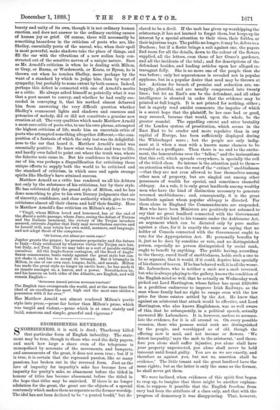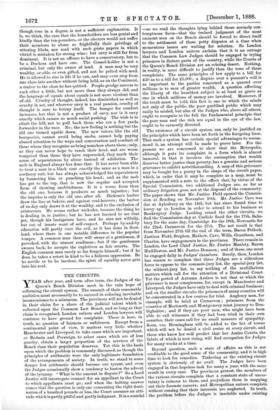SNOBBISIINESS REVERSED.
SNOBBISHNESS, it is said, is dead ; Thackeray killed that particular form of English imbecility. The state- ment may be true, though to those who read the daily papers, and mark how large a share even of the telegrams is monopolised by accounts of the movements, and banquets, and amusements of the great, it does not seem true ; but if it is true, it is certain that the repressed passion, like so many passions, has broken out in the reversed form. Just as the love of impurity for impurity's sake has become love of impurity for purity's sake, so abasement before the titled in honour of titles has become abasement before the titled in the hope that titles may be smirched. If there is no longer adulation for the great, the great are the objects of a special contumely which makes them as separate as the former worship. The idol has not been declared to be "a pouted bredd," but de- dared to be a devil. It the mob has given up worshipping the aristocracy, it has not learned to forget them, but keeps up its interest by a special attention to their vices, their foibles, or their injurious ways. The public no longer, it may be, defers to a Duchess ; but if a florist brings a suit against one, the papers find room for all the details, down to the colour of the flowers supplied, all the letters, even those of her Grace's gardener, and all the incidents of the trial ; and for descriptions of the defendant besides, and leading articles upon her alleged ex- travagant folly. She is no more one of the people than she was before ; only her separateness is revealed not in popular applause, but in a popular desire that mud may be thrown at her. Actions for breach of promise and seduction axe, un- happily, plentiful, and are usually compressed into twenty lines ; but let an Earl's son be the defendant, and all other intelligence is shunted in order that the evidence may be printed at full length. It is not printed for nothing, either ; but is eagerly read amidst comments the impulse of which is a secret hope that the plaintiff, be her case bad or good, may succeed, because that would, upon the whole, be the greater scandal. The appalling extent and utter brutality of the London system of prostitution, which seems in the East End to be cruder and more repulsive than in any capital of Europe, has been sufficiently displayed during the Whitechapel scare ; but the people are only indig- nant at it when a man with a known name chances to be revealed as a profligate. Then there is no end to the excite- ment, the lamentations over the "fallen," and the insinuations that this evil, which spreads everywhere, is specially the evil of the titled class. So intense is the attention paid to them— an attention which was the root of the " extinct " snobbishness —that they are not even allowed to lose themselves among other men of property, but are singled out among other possessors of wealth for special, and sometimes shameful obloquy. As a rule, it is only great landlords among wealthy
men who have the kind of distinction necessary to generate reversed snobbishness ; and, consequently, it is the great landlords against whom popular obloquy is directed. For them alone in England the Commandments are suspended. Men who have been Ministers are positively not ashamed to say that no great landlord connected with the Government ought to sell his land to his tenants under the Ashbourne Act, an argument which can be dictated only by pure malice against a class, for it is exactly the same as saying that no holder of Consols connected with the Government ought to vote for the Appropriation Act. He personally benefits by it, just as he does by sunshine or rain, and no distinguished person, especially no person distinguished by social rank, ought to benefit by anything. The public having, according to the theory, cured itself of snobbishness, holds such a one to be so separate, that it would, if it could, deprive him specially of his chance of heaven. If he has behaved well, it is all the worse. Mr. Labouchere, who is neither a snob nor a snob reversed, but who is always playing to the gallery, knows the condition of the English mind so well, that he actually on Wednesday week picked out Lord Hartington, whose father has spent £320,0150 in a profitless endeavour to improve Irish Railways, as the man whose family had no right to escape even with the low price for those estates settled by the Act. He knew that against an aristocrat that attack would be effective, and Lord Hartington, who also knows Englishmen, was so well aware of this, that he subsequently, in a political speech, actually answered Mr. Labouchere. It is, however, useless to accumu- late the evidence, for it is all around us. On every possible occasion, those who possess social rank are distinguished by the people, and worshipped as of old, though the offering now is mud, and not incense or flowers. We detest inequality,' says the mob to the aristocrat, 'and there- fore you alone shall suffer injustice, you alone shall have your property unprotected, you alone shall never be held innocent until found guilty. You are as we are exactly, and therefore as against you, but not us, assertion shall be evidence.' The little tenant and the great landlord have the same rights ; but as the latter is only the same as the former, he shall never get them.
We were inclined, when evidences of this spirit first began to crop up, to imagine that there might be another explana- tion, to suppose it possible that the English freedom from envy had been the attribute of a class only, and that with the progress of democracy it was disappearing. That, however, tliough true in a degree, is not a sufficient explanation. It is, we think, the case that the householders are less genial and kindly than the ten-pounders, or the electors would not suffer their members to abuse so frightfully their privilege of uttering libels, nor read with such gusto papers in which vitriol is mistaken for strong wine; but envy is still far from dominant. It is not an offence to have a conservatory, but to be a Duchess and have one. The Consol-holder is not a criminal, but only the owner of land. A man may be very wealthy, or able, or even gifted, and not be pelted with mud. He is allowed to rise in life if he can, and may even step from one class into another without being held, as on the Continent, a traitor to the class he has quitted. People grudge success to each other a little, but not more than they always did, and the language of equals about equals is not more virulent than of old. Cruelty of thought, indeed, has diminished as well as cruelty in act, and wherever envy is a real passion, cruelty of thought is sure to betray itself. The hunger for comfort increases, but that is not a product of envy, nor is it envy exactly which causes so much social pushing. The wish is to climb the hill, not to pull back those who are a few yards forwarder in the race. No; the new feeling is nothing but the old one turned upside down. The new voters, like the old bourgeoisie, cannot avoid being snobs, cannot help paying absurd attention to the ways and conversation and conduct of those whom they recognise as being somehow above them; only, as they can never hope to reach their level, and are worse tempered than those they have superseded, they mark their sense of separateness by abuse instead of adulation. The mob in England always has done that. It has never been able to treat a man in a black coat exactly the same as a man in a corduroy suit, but has always acknowledged his separateness by bonneting him or punching his head ; and as the mob has got to the top, that is now the regular and accepted form of showing snobbishness. It is a worse form than the old one, because it produces so much injustice ; but the impulse is only the old one, after all. Dickens's barber drew the line at bakers, and against coal-heavers ; the barber of to-day only draws it at the wealthy, and to the exclusion of aristocrats. He seems rather wickeder, because the thing he is dealing in is justice; but he has not learned to see that yet, though his instigators have, and he sins not wilfully, but out of innate want of self-respect. Perhaps by-and-by education will partly cure the evil, as it has done in Scot- land, where there is one notable difference in the popular temper. A common man there will swear at a gentleman, if provoked, with the utmost readiness ; but if the gentleman swears back, he accepts the expletives as fair retorts. The English common man rarely so far forgets himself ; but if he does, he takes a retort in kind to be a hideous oppression. Be he servile or be he insolent, the spirit of equality never gets into his soul.











































 Previous page
Previous page